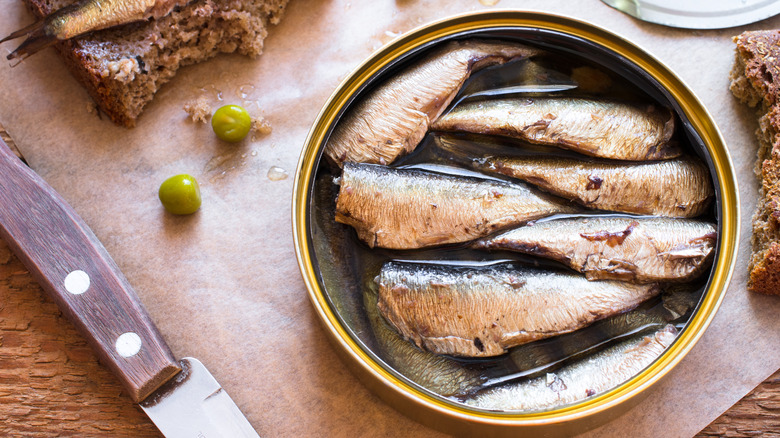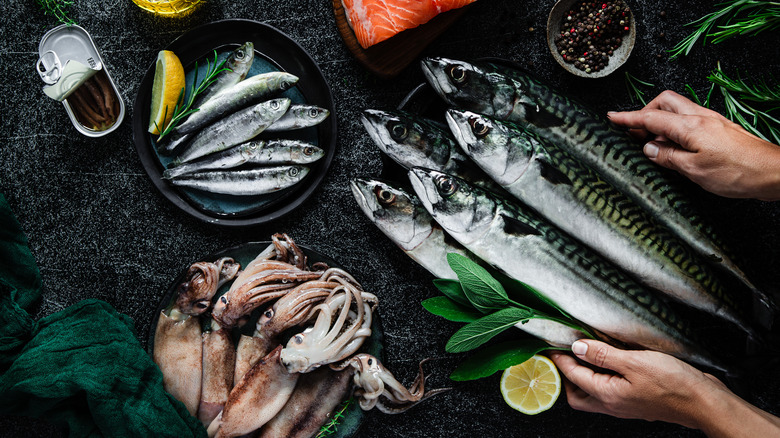The Polarizing Protein That Can Help Lower Your High Blood Pressure
High blood pressure factors into health problems such as heart disease, diabetes, and stroke — especially if you also have low levels of HDL cholesterol and high triglycerides. However, the good news is that you can partly influence your blood pressure and blood lipids through your diet. Typically, people with high blood pressure might be advised to reduce sodium and increase potassium in their diet. Certain protein sources, like skinless poultry and fish, can also help control high blood pressure.
Fish contains omega-3 fatty acids, which have many health benefits and are essential in protecting you against cardiovascular disease, cancer, cognitive decline, and eye disease. People might turn to fish oil to improve their cholesterol, and people with high blood pressure might also consider adding more omega-3s to their diet. A 2016 article in the Journal of Nutrition, for example, found that taking a fish oil supplement for eight weeks was associated with reductions in high systolic blood pressure.
However, taking fish oil supplements often comes with that nasty, fishy burp as a side effect. If that's something you want to avoid, you can also turn to sardines to provide healthy omega-3s and essential vitamins and minerals to reduce your blood pressure instead.
Sardines contain many nutrients that reduce blood pressure
The health benefits of sardines might surprise you. A can of sardines has 18 grams of protein and 8.5 grams of fat, with just a single gram of saturated fat. That's because most of the fat in sardines comes from healthy unsaturated fat, with 737 milligrams of omega-3s. A can of sardines also has close to 300 milligrams of potassium, which lowers blood pressure by helping rid your body of excess sodium. Sardines are also good sources of calcium, iron, zinc, and magnesium.
According to a 2023 article in the journal Frontiers in Nutrition, sardines are also rich in arginine and taurine, two amino acids that improve the health of your heart and blood vessels. Arginine produces nitric oxide that relaxes blood vessels. Taurine works as an antioxidant to lower blood pressure, improve cholesterol, and manage blood sugar.
Angiotensin 2 is a substance that constricts your blood vessels and can increase your blood pressure. The angiotensin-converting enzyme (ACE) makes this substance, and many people with high blood pressure take ACE inhibitors to control their hypertension. A 2017 study in Food Research International found that the peptides in sardines combined with quercetin (a polyphenol found in plants such as apples and berries) can also inhibit ACE, thereby reducing inflammation and lowering blood pressure in laboratory models.
Do sardines have mercury?
You might have reservations about eating sardines and other types of fish due to their high levels of mercury and other metals. The Food and Drug Administration (FDA) said that all fish have some mercury, but it's safe to consume in small amounts for most people. Only young children and women who are pregnant, according to the FDA, should avoid fish with high levels of mercury such as shark, swordfish, or king mackerel, which may lead to mercury poisoning. Sardines have some of the lowest levels of mercury with concentrations similar to oysters, tilapia, and canned salmon.
A 2019 study in Food and Chemical Toxicology looked closely at the metal content of sardines and anchovies from Greece to weigh the risks against the nutritional benefits. Researchers found that eating 480 grams of sardines or anchovies each week presented minor concerns regarding mercury toxicity. However, the benefits of all of the other vitamins and nutrients in these fish significantly outweighed the risks.


